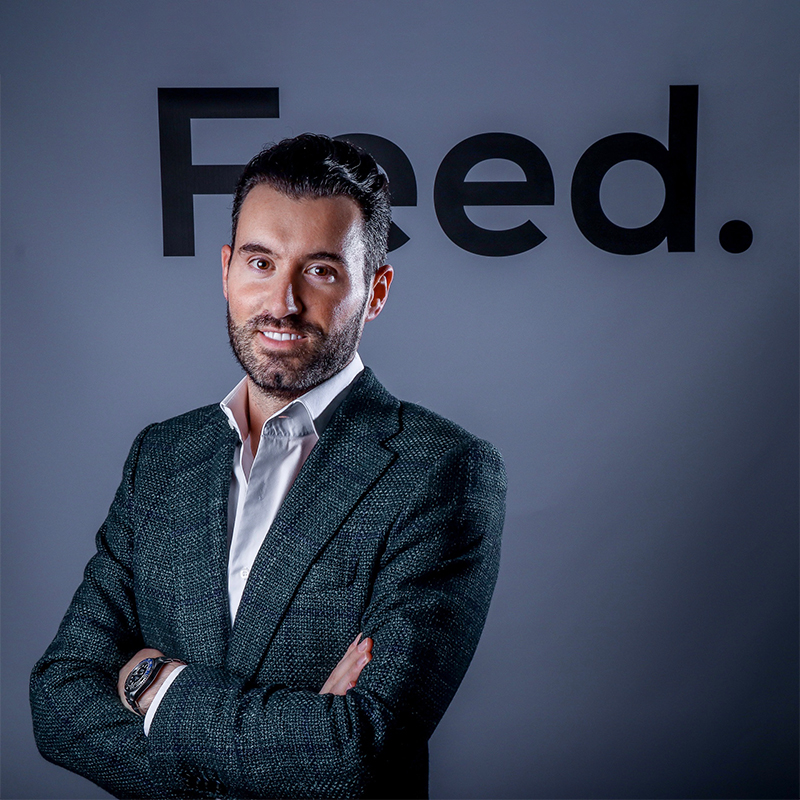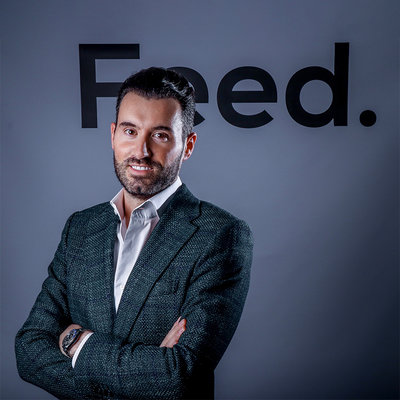
Image: Feed.

Image: Feed
As consumers have increasingly looked to dietary change and asked for more from their food, functional products such as meal-replacement drinks have steadily gained popularity. The sector is still developing however and while certain companies are finding success, the are not necessarily doing so across all regions. Feed launched in 2017 to make nutritionally-complete convenience meals available to French customers who had been unable to get hold of rivals Soylent or Huel. The range has grown to over 50 products with unique flavours – including savoury soups – to satisfy the most demanding of gourmands.

Images: Feed.
Berenice Baker:
When did you first get the idea for Feed?
Anthony Bourbon:
I worked for different businesses and came across this problem every day of lack of time to eat my lunch. At the end of the day, I was very hungry, and I began looking for solutions but only found products to lose weight with minimal calories.
At the same time, I discovered Soylent in the USA, but they didn’t deliver in Europe other than the UK, and in the UK, their recipes were not adapted to the European market. Their recipes included chemical ingredients and the taste wasn’t good, in my opinion.
I think it would be very complicated for French people to eat these because we are so dedicated to nice food, and we like to sit around the table for two hours at lunchtime. We can eat complementary food, but if it is not very good we will naturally not do it again.
Soylent and Huel did a great job to democratise the market for us, but I think the taste is key for the mass market, and that’s why I decided began to formulate my own recipes for my own meals and for my friends, who liked it and shared them.
Then I surrounded myself with doctors, nutritionists, food engineers and chefs like French chef Thierry Marx, a two-star Michelin chef, who is very interested in the future of food including food for space missions. He talks a lot about what we will eat in a few years and how we can improve our diet. It was difficult for a French chef to explain to other chefs that he’s going to make smart food with flavour.
We worked for one or two years to invent a wide range of favours and formats like bars, drinks, shakers, chocolate spread. And each one provides 100% of your daily needs: our mission is to deliver perfect nutrition.
When did you first start marketing Feed?
We launched in January 2017 when we had a large range of recipes and saw that our friends and colleagues wanted to try it out. I thought it would be difficult selling to French people used to eating real meals around a table, but when we built the website, it sold so quickly it was crazy, something like 10,000 meals sold in under two weeks. We understood that we can be a success in France where we didn’t have a rival smart food like Soylent or Huel. We raised €25m very quickly and will announce a new funding round soon. In France, we now employ more than 100 people.
What is Feed’s unique selling point in the complete meal replacement market?
The main difference from Soylent and Huel is we have the biggest range of products with more than 50 recipes. If you want to have a mass-market product, taste is key, in my opinion. Plus while Soylent and Huel have about €500m in turnover, that’s nothing compared with the snacking market. If we want to challenge the mass market for regular people, we have to have more recipes, with more taste because they want something different, not just chocolate and vanilla and maybe four or five recipes.
In France, we have a very tough market and we get a lot of hard feedback, so we worked a lot on our products so we can expand. We have a good platform and everyone can find the recipes they like whether savoury, sweet, shakes, bars, as a chocolate spread, all made by French chefs.
While we started online, it’s not normal to buy your food on a website. To be a mass-market product we have to connect with regular intentional retailers and promote this product to everyone in every city and that’s why we have a big team.
What countries sell Feed and what future markets are you targeting?
We sell our product in 30-50 countries online, and offline we are in ten countries; France of course, also the UK, Belgium, Switzerland, Italy, Dubai, Israel and others.
We have to explain to retailers what a smart food is and where to place it. In France, supermarkets have created a smart food area and we helped them to find other brands; Huel and Soylent are working with us to create this new category. The best position would be next to the sandwiches and ready meals.
Your ingredients are vegan and you have an organic range. Is sustainability important to Feed?
It’s really important to us as we have a responsibility as a start-up to move the line. I know that there have been moves by the big brands like Nestle, Danone and Muller, but because they’re so big it’s complicated for them. We are introducing major changes to our packaging and recipes to ensure sustainability.
Feed is the only mainstream smart food that offers savoury flavours. Why did you introduce them?
I think it’s logical for a French guy to want to eat a smart food that’s a meal; chocolate or vanilla might be good for breakfast but not for dinner. We knew that for lunch you could make meals using vegetables, tomatoes and mushrooms. It’s more complicated to develop because you can’t use sucralose and aspartame to give meals the right taste, so maybe that’s why our competitors didn’t want to do this. But we email from the US every day saying please come to us, we are fed up with chocolate and berries and we just want vegetables for lunch.
Final question – I know that you’ve already touched on the Crowdfunder efforts but what can we look forward to for Toast Ale in the next three to five years?
Well we’re only three years old and so much is happening for us, it’s so hard to predict that far in to the future. As you said, we have our Crowdfunder that’s live for the next three weeks. In August/September we will be re-launching with new branding that helps better communicate our story and environmental missions – explaining that it’s not just about bread – it’s the wider impact that food waste has on the planet. So the re-brand is quite a big project that we’ve been working on, which we’re really excited to get out there.
Going into next year, we will continue to expand across the US and looking at ways in which we can collaborate more on an international basis. We’ve recently done a collaboration in Australia, which is probably our furthest one. It’s still brewing – it’s fermenting at the moment, so it’s not quite ready yet. But yeah, we’re looking at more opportunities internationally to spread the knowledge of brewing with surplus bread and supporting charities internationally.